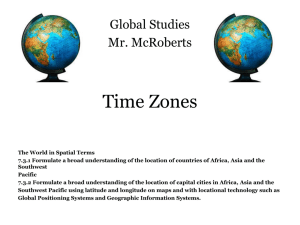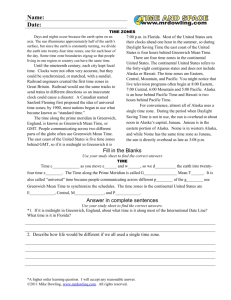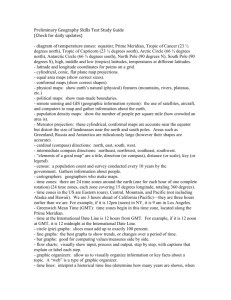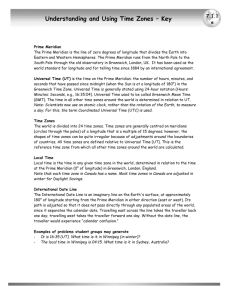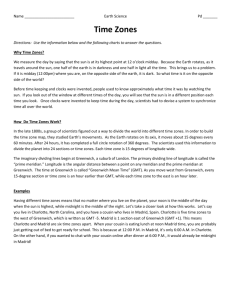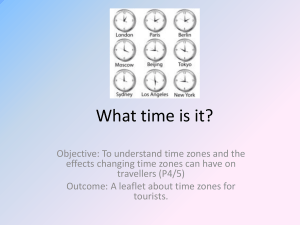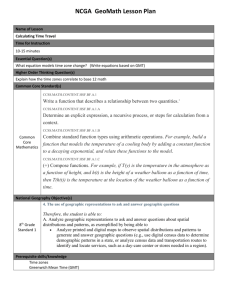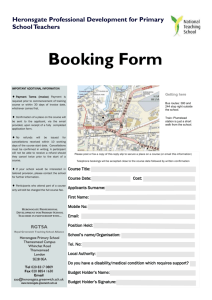Lesson 4 - International Time Zones
advertisement
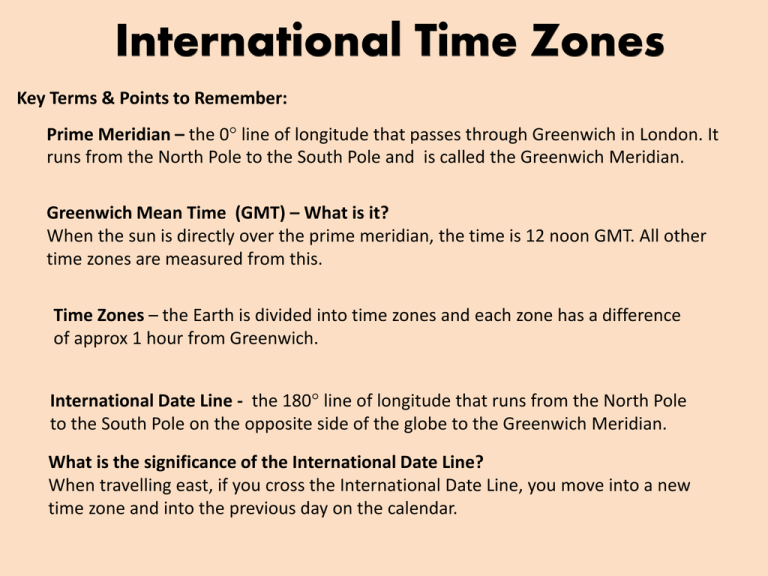
Key Terms & Points to Remember: Prime Meridian – the 0 line of longitude that passes through Greenwich in London. It runs from the North Pole to the South Pole and is called the Greenwich Meridian. Greenwich Mean Time (GMT) – What is it? When the sun is directly over the prime meridian, the time is 12 noon GMT. All other time zones are measured from this. Time Zones – the Earth is divided into time zones and each zone has a difference of approx 1 hour from Greenwich. International Date Line - the 180 line of longitude that runs from the North Pole to the South Pole on the opposite side of the globe to the Greenwich Meridian. What is the significance of the International Date Line? When travelling east, if you cross the International Date Line, you move into a new time zone and into the previous day on the calendar. It takes 24 hours for the earth to complete one full rotation of 360 360 Therefore, every 15 = approx 1 hr ( 24 = 15) The Earth travels from West to East therefore West is behind East. When calculating the GMT: Add 1 hour for each time zone East of Greenwich Subtract 1 hour for each time zone West of Greenwich. To calculate time in different time zones you need to know the Coordinated Universal Time (UTC) or GMT adjustment for each zone. There is a formula that can be followed when calculating the times in different zones. 𝑇𝑖𝑚𝑒 𝑖𝑛 𝑧𝑜𝑛𝑒 𝐵 = 𝑇𝑖𝑚𝑒 𝑖𝑛 𝑧𝑜𝑛𝑒 𝐴 − 𝐺𝑀𝑇𝐴 + 𝐺𝑀𝑇𝐵 It is also important to use 24-hour times in your calculations. To find the correct time zone for a particular city/country, you need to refer to a World Time Zone Map. This is an example of a World Time Zone Map sourced from http://www.igooglemaps.com/gfx/map_of_timezones.jpg The GMT/UTC is recorded at the bottom of each time zone for reference. Example A: If it is 4.30pm in Wellington, New Zealand , what time is it in Brisbane? 𝑇𝑖𝑚𝑒 𝑖𝑛 𝑧𝑜𝑛𝑒 𝐵 = 𝑇𝑖𝑚𝑒 𝑖𝑛 𝑧𝑜𝑛𝑒 𝐴 − 𝐺𝑀𝑇𝐴 + 𝐺𝑀𝑇𝐵 𝑇𝑖𝑚𝑒 𝑖𝑛 𝐵𝑟𝑖𝑠𝑏𝑎𝑛𝑒 = 𝑊𝑒𝑙𝑙𝑖𝑛𝑔𝑡𝑜𝑛 𝑡𝑖𝑚𝑒 − 𝐺𝑀𝑇𝑊 + 𝐺𝑀𝑇𝐵𝑟𝑖𝑠 = 16: 30 − +12: 00 + +10: 00 = 4.30 + 10: 00 = 14:30 = 2.30pm ∴ 𝑊ℎ𝑒𝑛 𝑖𝑡 𝑖𝑠 4.30 𝑝𝑚 𝑖𝑛 𝑊𝑒𝑙𝑙𝑖𝑛𝑔𝑡𝑜𝑛, 𝑖𝑡 𝑖𝑠 2.30 𝑝𝑚 𝑖𝑛 𝐵𝑟𝑖𝑠𝑏𝑎𝑛𝑒 Let’s try another example: If it is 3.30PM in San Francisco on Sunday , what time is it in Brisbane? 𝑇𝑖𝑚𝑒 𝑖𝑛 𝑧𝑜𝑛𝑒 𝐵 = 𝑇𝑖𝑚𝑒 𝑖𝑛 𝑧𝑜𝑛𝑒 𝐴 − 𝐺𝑀𝑇𝐴 + 𝐺𝑀𝑇𝐵 𝑇𝑖𝑚𝑒 𝑖𝑛 𝐵𝑟𝑖𝑠𝑏𝑎𝑛𝑒 = 𝑆𝑎𝑛 𝐹𝑟𝑎𝑛 𝑡𝑖𝑚𝑒 − 𝐺𝑀𝑇𝑆𝑎𝑛 𝐹𝑟𝑎𝑛 + 𝐺𝑀𝑇𝐵𝑟𝑖𝑠 = 15: 30 − −8: 00 + +10: 00 = 23: 30 + 10: 00 = 33:30 = 1 day + 09:30 hrs ∴ 𝑊ℎ𝑒𝑛 𝑖𝑡 𝑖𝑠 3.30 𝑝𝑚 𝑖𝑛 𝑆𝑎𝑛 𝐹𝑟𝑎𝑛𝑐𝑖𝑠𝑐𝑜 𝑜𝑛 𝑆𝑢𝑛𝑑𝑎𝑦, 𝑖𝑡 𝑖𝑠 9.30 𝑎𝑚 𝑖𝑛 𝐵𝑟𝑖𝑠𝑏𝑎𝑛𝑒 𝑜𝑛 𝑀𝑜𝑛𝑑𝑎𝑦 It is Monday in Brisbane because we have crossed the international date line. This concludes our lesson on International Time Zones Now try the worksheet, using the link to the Time Zone Map to work out the GMT values you will need in your calculations. These can then be checked by accessing the Time Converter Link Provided on the wiki page.


